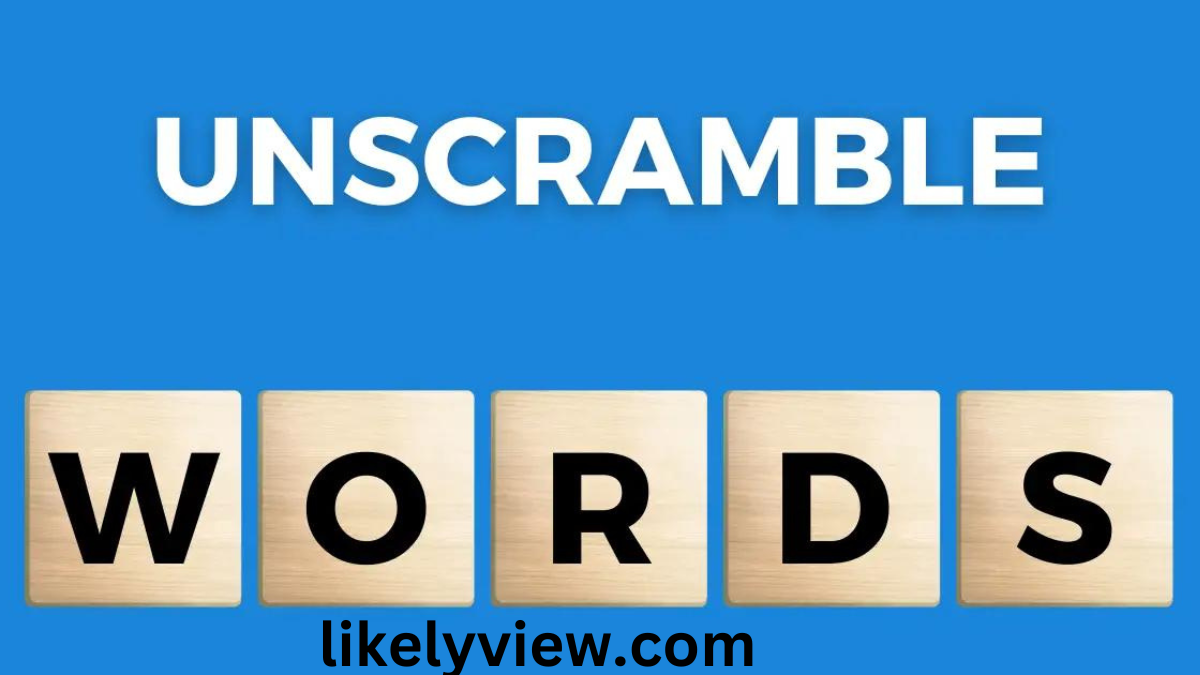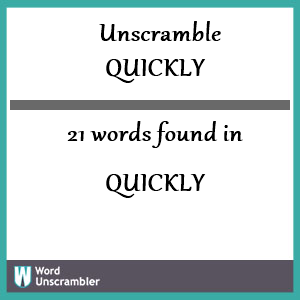Mastering the Art of unscramble words quickly: Expert Tips and Tricks

Introduction
Unscrambling words might seem like a simple task, but when faced with a jumble of letters and the ticking clock, it can quickly become a brain-bending challenge. Whether you’re playing a word game like Scrabble, solving puzzles, or just trying to improve your cognitive abilities, the skill of quickly unscrambling words is invaluable. In this comprehensive guide, we’ll dive into the art and science of unscrambling words, offering expert tips, strategies, and exercises to help you master this skill unscramble words quickly.
But why is this important? For one, word games have become a popular pastime, with millions of players around the world competing to showcase their vocabulary prowess. Beyond that, the ability to unscramble words quickly can enhance your linguistic skills, sharpen your mental agility, and even boost your creativity. So, let’s embark on this journey to become a word unscrambling pro!
Understanding the Basics of Word Unscrambling
Before we dive into advanced strategies, it’s essential to understand the basics of word unscrambling. What exactly does it mean to unscramble a word, and why does it sometimes feel so challenging unscramble words quickly?

unscramble words quickly At its core, unscrambling a word involves rearranging a set of jumbled letters to form a meaningful word. This might sound straightforward, but the complexity arises from the number of possible combinations, especially as the length of the word increases. For example, a 3-letter word has only 6 possible arrangements, but a 7-letter word has over 5,000 potential combinations unscramble words quickly!
The human brain processes language using a series of mental shortcuts, often recognizing familiar patterns and structures quickly. However, when these patterns are disrupted, as in the case of scrambled words, our brains have to work harder to decode the information. This is why unscrambling words can sometimes feel like trying to solve a puzzle with missing pieces unscramble words quickly.
Understanding the basics also means familiarizing yourself with the types of words and letter combinations that are commonly used in word games and puzzles. English, like all languages, has specific rules and structures that govern word formation, and being aware of these can give you an edge when unscrambling. For example, certain letters often appear together (like “th,” “ch,” and “st”), and knowing these common pairings can help you spot potential words more quickly.
Techniques for Unscrambling Words Quickly
Now that we’ve covered the basics, let’s explore some proven techniques that can help you unscramble words more quickly. These strategies are used by word game champions, linguists, and even cognitive scientists to crack even the toughest jumbled letters unscramble words quickly.
Look for Common Prefixes and Suffixes
One of the most effective ways to start unscrambling a word is by identifying common prefixes and suffixes. In English, words often begin or end with familiar letter combinations like unscramble words quickly Spotting these can instantly give you a clue about the structure of the word and reduce the number of potential combinations you need to consider unscramble words quickly.
For instance, if you’re faced with the letter “ingrown,” recognizing that “ing” is a common suffix could lead you to quickly identify the word “writing.” This technique not only speeds up the unscrambling process but also helps in breaking down longer words into more manageable chunks unscramble words quickly.
Use Vowel-Consonant Patterns
Another useful technique involves analyzing the vowel and consonant patterns within the scrambled letters. English words typically follow specific vowel-consonant structures, such as alternating vowels and consonants unscramble words quickly.
When you have a mix of letters, try grouping them into possible vowel-consonant patterns. For example, if you’re given the letters “after,” you might start by pairing vowels with consonants to form combinations like “cat” or “rate.” This method can quickly lead you to the correct word or at least narrow down your options.
Start Small and Build Up
If you’re struggling to unscramble a long word, it can be helpful to start with smaller words that can be formed from the letters. Often, larger words contain smaller words within them, and identifying these can give you a foothold to build from unscramble words quickly.
For example, with the letters “ration,” you might first spot the smaller word “rat” or “art.” From there, you can experiment with adding the remaining letters to form the full word “ration.” This technique works well because it allows you to make progress even if you can’t immediately see the entire word.
Practice Word Families
Word families are groups of words that share a common base or root, such as “run,” “runner,” and “running.” Practicing with word families can enhance your ability to recognize and unscramble related words more quickly unscramble words quickly.
When faced with a scrambled word, consider whether it might belong to a familiar word family. If you see the letter “running,” you might recall the word “run” and then realize that “running” is a related word that uses all the letters. This approach leverages your existing vocabulary knowledge to accelerate the unscrambling process unscramble words quickly.
Use an Anagram Solver (When Allowed)
In some word games or puzzles, it’s permissible to use tools like anagram solvers or word unscramblers. These online tools can be incredibly helpful, especially for words that are difficult to decipher on your own. Simply input the scrambled letters, and the tool will generate a list of possible words unscramble words quickly.
While this method might feel like “cheating” to some, it’s a valuable resource for learning and improving your unscrambling skills. By using an anagram solver, you can familiarize yourself with word patterns and structures that you might not have noticed before, making you a better unscrambler in the long run.
The Role of Vocabulary and Linguistic Knowledge
Your ability to unscramble words quickly is closely tied to the breadth and depth of your vocabulary. The more words you know, the easier it will be to recognize potential matches when faced with scrambled letters. But building a strong vocabulary doesn’t happen overnight—it requires consistent effort and practice.
Read Regularly
One of the best ways to expand your vocabulary is by reading regularly. Exposure to a wide range of words through books, articles, and other written material helps reinforce your understanding of word structures and meanings. The more familiar you are with different words, the quicker you’ll be able to spot them when unscrambling.
Try to read a variety of genres, from fiction and non-fiction to poetry and technical writing. Each genre will expose you to different vocabulary and writing styles, enriching your linguistic knowledge and making you a more versatile word unscrambler.
Play Word Games
Word games like Scrabble, Boggle, and Words With Friends are not only fun but also excellent tools for building your vocabulary and improving your word unscrambling skills. These games challenge you to think creatively and strategically about word formation, often under time constraints.
As you play more word games, you’ll start to recognize patterns and develop strategies for quickly identifying possible words from a set of letters. Additionally, playing against others can introduce you to new words and techniques, further enhancing your skills.
Study Etymology
Etymology, the study of the origin and history of words, can provide valuable insights into how words are formed and related to each other. Understanding the roots of words, as well as common prefixes and suffixes derived from Latin, Greek, and other languages, can give you a significant advantage when unscrambling words.
For example, knowing that the prefix “bio-” means “life” can help you quickly identify words related to biology, such as “biography” or “biosphere,” even when the letters are scrambled. By studying etymology, you can develop a deeper understanding of word formation and structure, making it easier to unscramble complex words.
The Psychology of Word Unscrambling
The process of unscrambling words isn’t just about linguistic knowledge—it’s also influenced by cognitive and psychological factors. Understanding how your brain works when faced with a jumbled word can help you develop strategies to improve your speed and accuracy.
Pattern Recognition
Humans are naturally inclined to recognize patterns, and this ability plays a crucial role in word unscrambling. When you look at a set of scrambled letters, your brain automatically starts searching for familiar patterns, such as common letter combinations or word shapes.
To improve your pattern recognition skills, practice with anagrams and word puzzles regularly. Over time, you’ll become more adept at spotting potential word patterns quickly, reducing the time it takes to unscramble words.
Mental Flexibility
Mental flexibility refers to the ability to shift your thinking or approach when faced with a challenge. When unscrambling words, this means being open to trying different letter combinations and not getting stuck on one possible solution.
If you find yourself fixated on a particular arrangement of letters, try stepping back and looking at the letters from a different perspective. This could involve rearranging the letters physically (if you’re working with paper or tiles) or mentally considering alternative word structures. Developing mental flexibility can help you overcome roadblocks and find the correct word more quickly.
Managing Stress and Time Pressure
Unscrambling words under time pressure can be stressful, which can, in turn, hinder your ability to think clearly and effectively. Stress can cause your mind to race or become clouded, making it more difficult to identify the correct word.
To manage stress and improve your performance, practice unscrambling words in a relaxed setting before gradually introducing time limits. Focus on staying calm and composed, even when the clock is ticking. Techniques such as deep breathing or positive self-talk can help reduce anxiety and keep your mind sharp.










